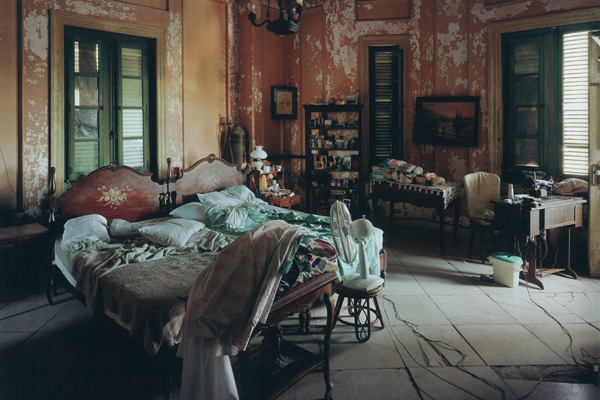By any standards, Haiti represents a great concentration of misery and dashed hopes. From the air, the Caribbean republic is a sun-scorched clinker; deforestation, caused by a ruinous cutting of timber for charcoal, has destroyed much of the green. Since independence in 1804, moreover, a succession of emperors, kings and presidents-for-life has contrived to instil terror in the people.
François ‘Papa Doc’ Duvalier, dictator of Haiti from 1957 to 1971, entertained more than an anthropological interest in Afro-Caribbean sorcery rituals. His wardrobe of black suits and black homburgs lent him the aspect, says Bernard Diederich, of the voodoo divinity Baron Samedi, who haunts the churchyards in a top hat and tails like a ghoulish Groucho Marx. (James Bond encounters an American version of Baron Samedi in the henchman of Live and Let Die’s dastardly Mr Big, chairman of the New York-based Black Widow Cult.)
The Haitian dictator’s son Jean-Claude ‘Baby Doc’ Duvalier was no less bizarre. On 5 November 2002, hoping to interview him, I dialled his number from my home in London. The instant he picked up his phone in the south of France, a neighbour let off fireworks beneath my window, and he hung up. Bernard Diederich, a former Time magazine journalist, has also tried but failed to interview Duvalier junior. A series of political convulsions — attempted assassinations, bomb plots — has followed the president’s expulsion from Haiti in 1986 and no doubt he still sees journalists as part of a larger threat. By an irony, Baby Doc lived near Graham Greene in Antibes; Greene had of course delivered a withering attack on the Duvalier tyranny in his Haitian novel The Comedians.
In 1968, by way of retaliation, Papa Doc issued a pamphlet entitled Graham Greene — Finally Exposed, in which he sought to discredit the novelist as, among other things, a ‘benzedrin addict’ and ‘habitué of leper houses’ (the observations were not far wrong). Diederich, a New Zealand-born Catholic, had by that time known Greene for 15 years, having first met him in Haiti in the mid-Fifties. Their friendship took root immediately, it seems, and continued for 37 years until Greene’s death in 1991, at the age of 86.
Seeds of Fiction, Deiderich’s long-awaited memoir of Greene, concentrates on the Haiti years, when the Caribbean outpost was patronised by the likes of Truman Capote and Noël Coward. During his visits to the Haitian capital of Port-au-Prince, Greene stayed at the Hotel Oloffson, a gingerbread mansion disguised as the ‘Hotel Trianon’ in The Comedians. Diederich, was married to a Haitian and knew Haiti intimately. The English language newspaper he edited in Port-au-Prince, the Haiti Sun, was known for its anti-Duvalierist stance. Through Diederich, Greene was able to meet a number of Haitian notables.
Among them was the gossip columnist Aubelin Jolicoeur (literally, Little Dawn Pretty Heart), who appears as the foppish Petit Pierre in Greene’s 1966 novel. Modesty was not one of Jolicoeur’s ‘strong points’, Diederich reminds us. An elfin figure, he routinely appeared at the Oloffson’s bar dressed in a white suit and paisley ascot, dapper beyond reality. In his obituary of Greene for the Guardian, Jolicoeur outdid even himself: ‘I was grateful to Graham to have enhanced my legend to such an extent that some fans kneel at my feet or kiss my hand in meeting a man living his own legend.’ (Jolicoeur died in 2005, possibly of Alzheimer’s disease, in a Port-au-Prince rooming house.)
Like many of his generation, Greene was punctilious in answering his letters (in old age he received an average of 180 a month). From his correspondence with Diederich, previously unpublished, we learn much about his pleasures, foibles and, above all, generosity. Concerned that the academic detail in Diederich’s book on Somoza would fatally hinder sales, Greene suggested substantial cuts. (‘Please don’t be discouraged by my criticisms’.)
Seeds of Fiction is intended, partly, as a riposte to Norman Sherry and other ‘dirty linen’ biographers who have sought to expose a darker shade of Greene and, in consequence, lost sight of Greene the man. Throughout, Diederich commends the ‘pixie sense of humour’ in Greene and his fascination with what lay outside his class and culture (‘There must be a brothel where we at least can get a cold drink,’ Greene typically gripes in Haiti.)
In pages of mesmeric detail, Diederich chronicles Greene’s friendship with the Panamanian strongman General Torrijos, as well as his travels round rural Nicaragua with the Sandinistas in the early 1980s. In an especially poignant scene, Greene is described as immersed in The Letters of Evelyn Waugh (edited by Mark Amory) while alone in a Panama City hotel. Among Catholic writers, perhaps only Waugh won Greene’s unstinting admiration and love; his death in 1966 was devastating to Greene.
In 2004, accompanied by the Haitian photographer Noelle Théard, I called on Diederich at his home in Miami. (Noelle and I had just returned from Port-au-Prince where, laughably, a room in the Hotel Oloffson had been named after me as the author of a book on Haiti.) Diederich, a grizzled, whiskery presence, told us of his intention to write a book on Greene. (‘I haven’t shown a single one of the letters to Sherry,’ he growled.) The result, Seeds of Fiction, is one of the finest books yet written on Greene — a triumph of tender recollection and devotion.





Comments